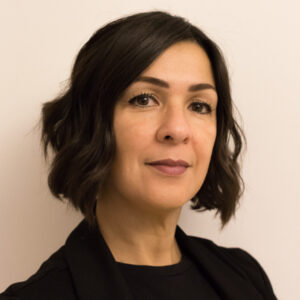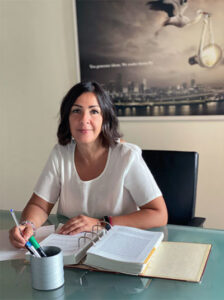Hello Mrs Serrau. Please tell us with whom do we have the pleasure?

Nice to meet you! My name is Monica Serrau and I’ve been working for Metroconsult for the past 20 years. As you can imagine, quite a few things have changed since then. Back in the days, I had been hired to enter data into a new system. At the beginning of my job, I didn’t even know what an application or registration number was! But a healthy curiosity and experienced colleagues made me learn quickly.
After having learned the patent and trademark processes, rules, and timelines necessary to handle the formalities related thereto, I passed the exam to become a trademark attorney. But having discovered my attitude to manage deadlines, my current job profile is better described as IP administrator. And unlike other bigger law firms where one administrator only focuses on a specific IP Asset and works for one specific region, here at Metroconsult I now manage various types of filings and prosecutions from all around the world.
I imagine that means a lot of different rules!
I switch from European to US patent applications, maintaining patents, preparing estimates, renewing trademarks and designs. So it’s not boring and not the same thing every day!
What is your part in protecting a client’s asset? How do you support patent and trademark attorneys?
Generally, one can clearly state that my tasks at Metroconsult are very diverse.
Mainly, I support the attorneys regularly in their day-to-day tasks by reminding them of the deadlines for the projects they have in care and handle administrative matters and formalities. Furthermore, I stay in close contact with clients to help them in case they have questions and ensure that they send instructions on time i.e. before any important deadlines.
Taking administrative matters into account, I am also involved in drafting budgets and cost-planning for i patent portfolios and I am responsible for developing and customizing the firm’s own database.
Are there any particular skills a formality officer needs to have?
In my case, a good memory is enormously helpful. Whenever I come across a difficult case, I learn by heart all important aspects for future cases. It saves time!.
In combination with memory, calculating deadlines is also very important. Having a start date, this allows you to calculate all following milestones and deadlines for a patent or trademark prosecution without spending time searching for the rules. Naturally I still feed the dates into the system.
And finally, don’t panic. Managing all different kinds of deadlines, keeping calm and not stressing too much is crucial for your health and wellbeing.
Do you have a specialization or a favorite field of expertise?
As a formality officer, I currently am less specialized in a specific jurisdiction; I am concurrently working in more thanseveral jurisdictions, making my job very “international”.
For example, I am currently working on hundreds of patents simultaneously from many different national legislations. Here, it is important to be aware of all the different national legislations because not respecting specific national laws could have problematic consequences.
Another field I work often in is called “Recordals”. This involves registering the transfer of IP assets from the owner to another party (called the assignee) as well as licensing agreements. My main task is to assist Metroconsult’s clients in this process and to register the transfer with the national patent and trademark offices. This process of registration involves a multitude of paperwork and may differ substantially from one jurisdiction to another.
How do you stay up to date with changes in IP law?
Our management system is structured in a way that every four months we receive country and law updates. As a trademark attorney, I am subject to continuous learning education, for which I must gain 30 credits every two years through online and onsite courses. This is complemented by various newsletters and frequent networking with other paralegals.
For example, on June 1 the new European unitary patent system will enter into force and we have a great deal to study really to understand the new procedures of this system.
Would you mind explaining the new unitary system in a few sentences?
You could sum it up to the Unitary Patent System aiming to make it easier, faster and more cost-effective for businesses to protect their innovations throughout the European Union. However it also makes it easier to lose protection in many countries at the same time.
Thank you very much for your time today and all the valuable insights into the job of a Formality Officer.
This interview is done by Emil Abseher, Helena Ehrlich, Lise Emanuelle Geahchan, Elsa Laziamond, and Jakob Roeckl – Bachelor students at the ESCP Business School – as part of their Collective Project.


